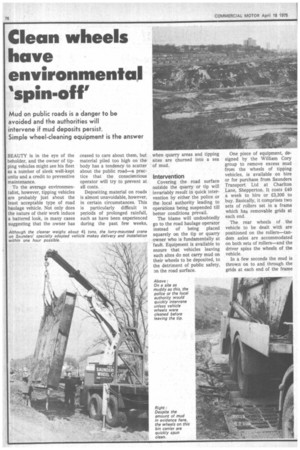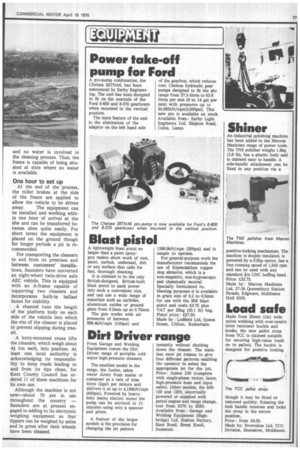Clean wheels have environmental 'spin-off'
Page 78

Page 79

If you've noticed an error in this article please click here to report it so we can fix it.
Mud on public roads is a danger to be avoided and the authorities will intervene if mud deposits persist.
Simple wheel-cleaning equipment is the answer
BEAUTY is in the eye of the beholder, and the owner of tipping vehicles might see his fleet as a number of sleek well-kept units and a credit to preventive maintenance.
To the average environmentalist, however, tipping vehicles are probably just about the least acceptable type of road haulage vehicle. Not only does the nature of their work induce a battered look, in many cases suggesting that the owner has ceased to care about them, but material piled too high on the body has a tendency to scatter about the public road—a practice that the conscientious operator will try to prevent at all costs.
Depositing material on roads is almost unavoidable, however, in certain circumstances. This is particularly difficult in periods of prolonged rainfall, such as have been experienced during the past few weeks, when quarry areas and tipping sites are churned into a sea of mud.
Intervention
Covering the road surface outside the quarry or tip will invariably result in quick intervention by either the police or the local authority leading to operations being suspended till better conditions prevail.
The blame will undoubtedly go to the road haulage operator instead of being placed squarely on the tip or quarry owner who is fundamentally at fault. Equipment is available to ensure that vehicles leaving such sites do not carry mud on their wheels to be deposited, to the detriment of public safety, Dn the road surface. One piece of equipment, designed by the William Cory group to remove excess mud from the wheels of tipping vehicles, is available on hire or for purchase from Saunders Transport Ltd at Charlton Lane, Shepperton. It costs £40 a week to hire or £3,300 to buy. Basically, it comprises two sets of rollers set in a frame which has removable grids at each end.
The rear wheels of the vehicle to be dealt with are positioned on the rollers—tandem axles are accommodated on both sets of rollers—and the driver spins the wheels of the vehicle.
In a few seconds the mud is thrown on to and through the grids at each end of the frame and no water is involved in the cleaning process. Thus, the frame is capable of being situated at sites where no water is available.
One hour to set up
At the end of the process, the roller brakes at the side of the frame are applied to allow the vehicle to be driven away. The equipment can be installed and working within one hour of arrival at the site and can be transferred between sites quite easily. For short terms the equipment is placed on the ground though for longer periods a pit is recommended.
For transporting the cleaners to and from its premises and between customers' installations, Saunders have converted an eight-wheel twin-drive axle AEC vehicle. This is equipped with an A-frame capable of supporting two cleaners and incorporates built-in ballast boxes for stability.
A channel runs the length of the platform body on each side of the vehicle into which the rim of the cleaner is placed to prevent slipping during transit.
A lorry-mounted crane lifts the cleaners, which weigh about 4i ton each, into position. At least one local authority is acknowledging its responsibility to keep roads leading to and from its tips clean, for Kent County Council has ordered 11 of these machines for its own use.
Although the machine is not new—about 70 are in use throughout the country — Saunders are at present engaged in adding to its electronic weighing equipment so that tippers can be weighed by axles and in gross after their wheels have been cleaned.








































































































































